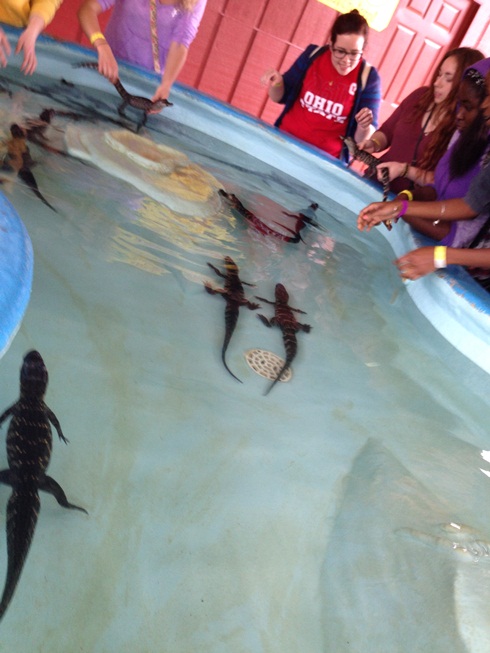Insta-Gator Ranch & Hatchery
Website: http://www.insta-gatorranch.com/
I have always found alligators and crocodiles interesting. The insta-gator farm in Covington, LA (about an hour from New Orleans) allowed me the opportunity to experience my interest. The tour guide was used humor and corniness to teach about the alligator, and discussed some interesting facts about the crocodile too. For example, the crocodile is much more aggressive than the alligator, and is known as the real man-eater between the two. While the alligator will attack humans, they generally do so when you get too close them, their nests, or their homes.
During my visit I was able to see many juvenile alligators ranging from about nine inches in length to roughly four feet in length. I was able to pet and handle some of the very small (9-12 inch) alligators. I also had the chance to see the guide handle a three or so foot alligator. All handled alligators had their mouths taped shut. During the tour we fed the alligators marshmallows of all things, which allowed for some interesting photo opportunities.
The Insta-Gator ranch claims that about six in ever one hundred alligators in the wild live to adulthood. The farm is able to double that success rate, and generally releases about twelve per hundred. This helps to increase and stabilize the population, which was once endangered, without overpopulating. The alligators who do not make it to the wild are used to help fund the ranch through food processing, clothing, and even alligator food. The ranch claims that they use every part of the alligator, and nothing goes to waste. They also claim that if they do not take all of the eggs from a nest when they go into the wild that the mother alligator will usually unintentionally kill the rest of the eggs by smashing them when they defend their nests – so if they don’t take all the eggs, the eggs will be killed anyway.
There are some ethical and moral concerns when considering this establishment, but ultimately, in the south alligator is manufactured, sold and eaten just like cows are in the north. Alligators are going to be killed and sold for food, so this establishment raises the alligators, releases some to keep the population healthy, while also making a healthy profit in the various alligator markets.
Still, even with the ethical and moral concerns considered, this is still a very fun place to come if you are in the New Orleans area. I never would have thought to visit such a place if it weren’t for a classmate, Bryce Jones, who had decided to do his research on alligators. Thanks to him, each of the students and faculty were able to experience this alligators.

